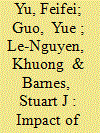| Srl | Item |
| 1 |
ID:
167021


|
|
|
|
|
| Summary/Abstract |
This study investigates how government policies affect firm-level innovation. To empirically test this relationship, we use panel data for the Korean renewable energy technology firms. Taking into account the results of various panel framework tests and sample size, we establish a panel vector autoregressive model in the first difference, and use a bias-corrected least squares dummy variable estimator to test complex dynamic relationships between public subsidies, firm heterogeneities (size, age, and slack), industry dynamic competition, and innovation. Based on the estimations, we find that there is a positive bidirectional causal relationship between firms’ innovation and each of the following: research and development (R&D) subsidy, available organizational slack, and industry dynamic competition. Non-R&D subsidy, firm size, and age do not have significant direct effects on firm-level innovation. However, non-R&D subsidy is involved in the relationship between R&D subsidy and firms’ innovation. We discuss some implications based on the findings of this study.
|
|
|
|
|
|
|
|
|
|
|
|
|
|
|
|
| 2 |
ID:
150766


|
|
|
|
|
| Summary/Abstract |
In this research, we aim to understand the influence of government subsidies on enterprises’ research and development (R&D) investment behavior, particularly in China’s renewable energy sector. We are also interested in examining how the attributes of enterprise ownership act as a moderating variable for the relationship between government subsidies and R&D investment behavior. Three classical panel data analysis models including the pooled ordinary least squares (OLS) model, the fixed effect model and the random effect model are employed. We find that government subsidies have a significant crowding out influence on enterprises’ R&D investment behavior and that the influence is further moderated by the attributes of enterprise ownership. Moreover, a panel threshold regression model is used to demonstrate how the influence of government subsidies on enterprises’ R&D investment behavior will change when government subsidies increase. Two thresholds, 0.6% and 10.1%, are identified. We recommend that relevant government departments should motivate enterprise R&D investment behavioral intention by increasing subsidies within a certain range. Different attributes of enterprise ownership should also be considered as part of policy reform and re-structuring relating to government subsidies.
|
|
|
|
|
|
|
|
|
|
|
|
|
|
|
|